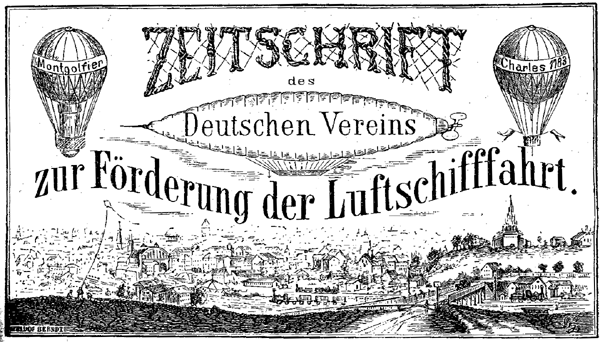
Verein zur Förderung der Luftschifffahrt
Encyclopedia
Founded on 1881-08-31, the Deutsche Verein zur Förderung der Luftschifffahrt was the first German aviation association.
in the Franco-Prussian War
of 1870/1871. The association's objects were to promote airship flight by all means, as well as to work on solving the problem of building steerable airships, and especially to support a permanent research station.
 In 1882 the association started printing , which was the first German technical aviation journal. In 1888 they printed under the title (Journal of airshipflight) and the Vienese
In 1882 the association started printing , which was the first German technical aviation journal. In 1888 they printed under the title (Journal of airshipflight) and the Vienese
flight association became co-editors. In 1892 the title changed to (Journal of airshipflight and atmospheric physics). In 1900 the association adopted the journal (illustrated aeronautical reports), with the subtitle (German journal of airshipflight).
In 1903, after Germany saw the founding of numerous other aeronautical associations, it changed its name to (Berlin association of airshipflight).
, Friedrich Hermann Wölfert
; the meteorologists Richard Aßmann, Arthur Berson
and Reinhard Süring
; the airship constructor Rudolf Hans Bartsch von Sigsfeld and the flight researcher Otto Lilienthal
.
Founding
The motivation for the association arose from the experience of the massive French military balloon units during the Siege of ParisSiege of Paris
The Siege of Paris, lasting from September 19, 1870 – January 28, 1871, and the consequent capture of the city by Prussian forces led to French defeat in the Franco-Prussian War and the establishment of the German Empire as well as the Paris Commune....
in the Franco-Prussian War
Franco-Prussian War
The Franco-Prussian War or Franco-German War, often referred to in France as the 1870 War was a conflict between the Second French Empire and the Kingdom of Prussia. Prussia was aided by the North German Confederation, of which it was a member, and the South German states of Baden, Württemberg and...
of 1870/1871. The association's objects were to promote airship flight by all means, as well as to work on solving the problem of building steerable airships, and especially to support a permanent research station.
Journal

Vienna
Vienna is the capital and largest city of the Republic of Austria and one of the nine states of Austria. Vienna is Austria's primary city, with a population of about 1.723 million , and is by far the largest city in Austria, as well as its cultural, economic, and political centre...
flight association became co-editors. In 1892 the title changed to (Journal of airshipflight and atmospheric physics). In 1900 the association adopted the journal (illustrated aeronautical reports), with the subtitle (German journal of airshipflight).
In 1903, after Germany saw the founding of numerous other aeronautical associations, it changed its name to (Berlin association of airshipflight).
Membership and activities
Among the members were: the airship pioneers Paul HaenleinPaul Haenlein
Paul Haenlein was a German engineer and flight pioneer. He flew in a semi-rigid-frame dirigible. His family belonged to the Citoyens notables, those notabilities who led the economy, administration and culture of Mainz.Haenlein received an education as a mechanical engineer and pattern maker...
, Friedrich Hermann Wölfert
Friedrich Hermann Wölfert
Friedrich Hermann Wölfert was a German publisher and aviation pioneer.-Early life:...
; the meteorologists Richard Aßmann, Arthur Berson
Arthur Berson
Arthur Josef Stanislaus Berson was a Polish meteorologist and pioneer of aerology who was a native of Neu Sandez, Galicia ....
and Reinhard Süring
Reinhard Süring
Reinhard Süring was a German meteorologist who was a native of Hamburg. He died in Potsdam, East Germany on 29 December 1950....
; the airship constructor Rudolf Hans Bartsch von Sigsfeld and the flight researcher Otto Lilienthal
Otto Lilienthal
Otto Lilienthal was a German pioneer of human aviation who became known as the Glider King. He was the first person to make well-documented, repeated, successful gliding flights. He followed an experimental approach established earlier by Sir George Cayley...
.

